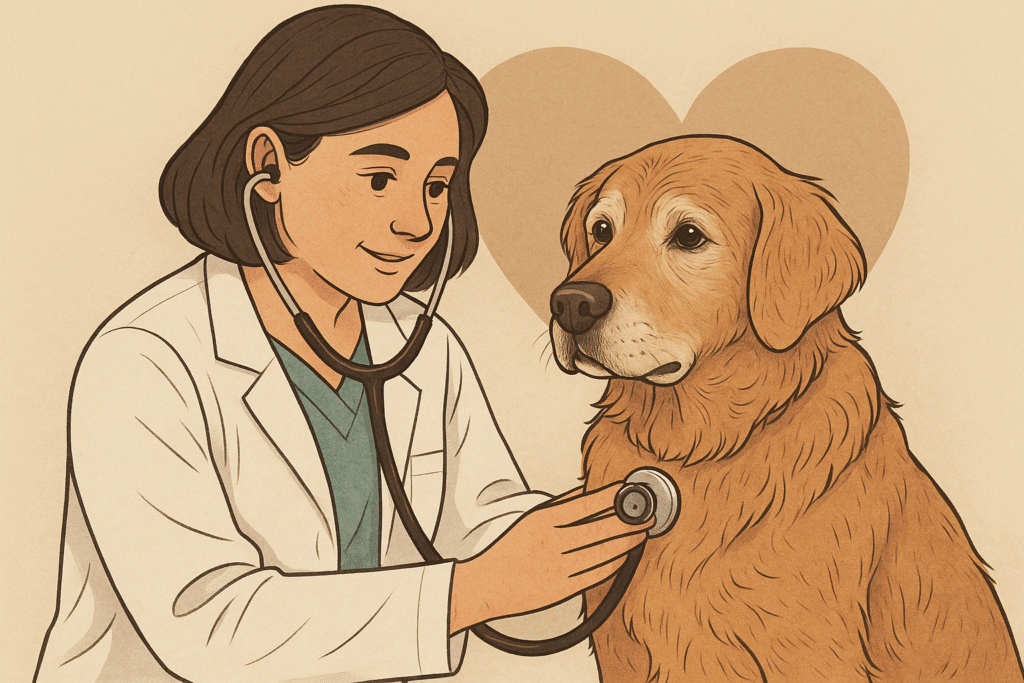If your veterinarian recently mentioned canine heart murmurs during a check-up, you’re probably feeling a mix of concern and confusion. You’re not alone, many dog owners hear this term without fully understanding what it means. The good news? Not every murmur is dangerous. But knowing the difference between a harmless murmur and one that signals a serious heart issue can make a world of difference.
As a veterinarian in general practice, I’ve heard canine heart murmurs in everything from sleepy senior pugs to hyperactive Labrador puppies—and in some cases, identifying that subtle swishing sound early has truly changed outcomes. Whether your dog is a bouncy puppy or a grey-muzzled companion, understanding what’s behind canine heart murmurs can help you take smarter, faster action.
This 2025 guide breaks down the must-know facts about canine heart murmurs using real-world insight and the latest veterinary research. You’ll learn what causes them, how we diagnose them, when to worry, and what you can do right now to protect your dog’s heart health.
Table of Contents
🐾 Key Takeaways: Canine Heart Murmurs
- Canine heart murmurs are abnormal sounds caused by turbulent blood flow in the heart.
- Not all murmurs are dangerous—some are benign (especially in puppies), while others indicate heart disease.
- Common causes include mitral valve disease, congenital defects, and breed-related conditions.
- Diagnosis involves stethoscope exams, echocardiography, chest x-rays, and sometimes bloodwork.
- Early detection and regular monitoring are vital, especially in high-risk breeds like Cavaliers, Dobermans, and Boxers.
- Many dogs with canine heart murmurs live long, active lives with proper treatment and care.
1. What Is a Canine Heart Murmur?
A canine heart murmur is an unusual sound—often described as a “whoosh” or “swish”—that occurs when blood flow through the heart or nearby vessels becomes turbulent. This sound is heard during routine auscultation (listening with a stethoscope), typically by your veterinarian during an exam.
It’s important to understand that canine heart murmurs aren’t a disease themselves; rather, they’re a sign that something may—or may not—be going on inside the heart. According to Cornell University’s Riney Canine Health Center, many murmurs in dogs are innocent and don’t require treatment, while others are the earliest warning signs of heart disease.
Types of Murmurs by Timing
- Systolic: Occur when the heart contracts.
- Diastolic: Occur when the heart relaxes.
- Continuous: Span both contraction and relaxation phases.
Grading Murmur Intensity (I to VI)
- Grade I: Barely audible, heard only in a quiet room.
- Grade II: Soft but easily heard.
- Grade III: Moderately loud; most common starting point for concern.
- Grade IV: Loud, can be heard on both sides of the chest.
- Grade V: Very loud, accompanied by a palpable chest vibration.
- Grade VI: Extremely loud; audible without a stethoscope in rare cases.
Veterinarians typically start with auscultation, but as outlined by Veterinary Practice, diagnostic imaging—especially echocardiography—is essential for accurate diagnosis and classification.
2. Are Heart Murmurs Always Dangerous?
Not necessarily. Many canine heart murmurs are harmless, especially in young puppies, while others indicate structural heart problems that require close monitoring or treatment. The key lies in identifying the type of murmur.
Innocent (Physiologic) Murmurs
These murmurs are soft, typically Grade I or II, and often heard in puppies under 6 months old. They usually disappear with age and don’t reflect any underlying heart condition. A 2021 study on ResearchGate found that up to 25% of murmurs in young puppies are physiologic and resolve without intervention.
Functional Murmurs
These occur due to non-cardiac conditions like:
- Fever
- Anemia
- Pregnancy
- Hyperthyroidism
They reflect altered blood flow, not heart structure defects, and often disappear once the underlying issue is treated.
Pathologic Murmurs
These result from anatomical or functional defects in the heart itself—like faulty valves or malformed vessels—and often need lifelong management.
As highlighted by Frontiers in Veterinary Science, the sound of a murmur alone cannot determine its significance. Clinical history, physical exam, and imaging are crucial for proper evaluation.
3. What Causes Pathologic Murmurs?
Pathologic canine heart murmurs are linked to a variety of congenital or acquired heart diseases. These murmurs point to a structural abnormality affecting blood flow through the heart or its vessels.
Common Causes of Pathologic Murmurs
| Condition | Description | Affected Breeds |
| Degenerative Mitral Valve Disease (DMVD) | Progressive wear-and-tear of the mitral valve causing backflow of blood. | Cavaliers, Toy Poodles, Dachshunds |
| Subaortic Stenosis | Narrowing below the aortic valve, increasing heart workload. | Golden Retrievers, Rottweilers |
| Patent Ductus Arteriosus (PDA) | A congenital vessel fails to close after birth, causing a continuous murmur. | More common in females; Poodles, Pomeranians |
| Pulmonic Stenosis | Congenital narrowing of the pulmonary valve. | Bulldogs, Beagles |
| Dilated Cardiomyopathy (DCM) | The heart muscle thins and weakens, leading to poor pumping function. | Dobermans, Boxers, Great Danes |
A recent AVMA Journal study emphasizes how breed predispositions and age can heavily influence which dogs are at risk—and underscores the importance of early detection through routine screening.
Some murmurs develop slowly and silently over years, while others are present from birth. Either way, understanding the underlying cause is essential to guide treatment and prognosis.
4. How Are Murmurs Diagnosed?
Detecting canine heart murmurs is only the beginning. To determine their cause and clinical significance, a structured diagnostic approach is essential. Your veterinarian may recommend one or more of the following tests:
Step-by-Step Diagnostic Process
- Auscultation
- Initial detection using a stethoscope.
- Helps identify murmur grade, timing, and location.
- Initial detection using a stethoscope.
- Echocardiography (Echo)
- The gold standard for evaluating heart structure and blood flow.
- Confirms whether the murmur is due to valve defects, chamber enlargement, or congenital abnormalities.
- The gold standard for evaluating heart structure and blood flow.
- Thoracic Radiographs (X-rays)
- Assess heart size and shape.
- Detect fluid accumulation in the lungs or chest cavity.
- Assess heart size and shape.
- Electrocardiogram (ECG)
- Measures the heart’s electrical activity.
- Useful if arrhythmias are suspected.
- Measures the heart’s electrical activity.
- Blood Pressure & Routine Blood Work
- Screens for systemic conditions (e.g., anemia, thyroid issues) that may cause functional murmurs.
- Screens for systemic conditions (e.g., anemia, thyroid issues) that may cause functional murmurs.

As described by VeterinaryPartner, echocardiography is especially valuable for identifying clinically silent but serious cardiac problems—particularly in breeds known to develop heart disease without showing early signs.
Early and accurate diagnosis helps veterinarians tailor monitoring and treatment plans to the individual dog, improving both longevity and quality of life.
5. When Should You Worry?
While many canine heart murmurs are benign, certain warning signs suggest a more serious underlying issue—and may require immediate follow-up.
Red Flags That Warrant Further Evaluation
- A new murmur in a senior dog
- Murmurs graded III/VI or higher
- Murmurs in puppies older than 6 months
- Signs of exercise intolerance, coughing, or fainting
- Laboured breathing or increased respiratory rate at rest
- Irregular heart rhythms or pulse deficits
These indicators suggest the murmur may be pathologic, and not just incidental. As reported by Clinician’s Brief, even dogs that appear healthy on the surface can harbor serious heart disease masked by a “simple” murmur.
Trust your instincts—if something seems off, even slightly, it’s worth a call to your vet. Timely diagnostics can prevent complications and improve your dog’s prognosis.
6. Treatment Options: What Can Be Done?
Treatment for canine heart murmurs depends entirely on their underlying cause. Some murmurs require no treatment at all, while others demand long-term medication or even surgery.
Tailored Treatment Strategies
- Innocent Murmurs:
- No treatment needed.
- Regular rechecks until the murmur disappears (usually by 6 months in puppies).
- No treatment needed.
- Medical Management:
- Pimobendan (for congestive heart failure or DCM)
- ACE inhibitors (e.g., enalapril, benazepril) to reduce cardiac workload
- Diuretics (e.g., furosemide) if fluid accumulation is present
- Pimobendan (for congestive heart failure or DCM)
- Surgical Correction:
- For certain congenital defects like Patent Ductus Arteriosus (PDA) or severe pulmonic stenosis
- Typically performed at referral centres with board-certified cardiologists
- For certain congenital defects like Patent Ductus Arteriosus (PDA) or severe pulmonic stenosis
- Ongoing Monitoring:
- Recheck exams and echocardiograms every 6–12 months
- Adjustments in medication as disease progresses
- Recheck exams and echocardiograms every 6–12 months

A comprehensive MDPI journal review emphasizes that early intervention—before signs like coughing or collapse appear—can significantly extend both quality and length of life for dogs with cardiac conditions.
Regardless of treatment type, a close partnership between pet owner and veterinarian is key to managing canine heart murmurs effectively over time.
7. What Dog Owners Should Do: A Practical Checklist
Managing canine heart murmurs starts with staying informed and proactive. Here’s a veterinarian-backed home checklist to guide your next steps:
🧠 5-Minute Home Checklist
- ✅ Ask your vet if a murmur was heard and what grade it was.
- ✅ If your dog is over 6 months and has a murmur, request an echocardiogram.
- ✅ Watch for changes in behaviour: coughing, panting at rest, or lethargy.
- ✅ Monitor breathing rate while sleeping (over 30 breaths per minute is a red flag).
- ✅ Consider pet insurance or budgeting for diagnostics and medication.
🐶 Long-Term Monitoring Tips
- Schedule rechecks every 6–12 months, even if your dog seems fine.
- Keep a journal of symptoms or changes to share with your vet.
- Ask if your dog’s breed predisposes them to cardiac conditions.
🚫 Breeding Precautions
If your dog has a diagnosed congenital heart condition, they should not be bred. According to foundational cardiology research by Ettinger & Feldman, many genetic heart conditions can pass to offspring, compounding the problem in future generations.
FAQs About Canine Heart Murmurs
❓ What breeds are most at risk for canine heart murmurs?
Small breeds like Cavalier King Charles Spaniels, Chihuahuas, and Toy Poodles are prone to mitral valve disease. Large breeds like Dobermans and Boxers are more susceptible to dilated cardiomyopathy, another common cause of canine heart murmurs.
❓ Can a heart murmur go away on its own?
Yes, especially in puppies. Innocent murmurs often resolve by 6 months of age. However, any murmur persisting beyond that should be evaluated by a vet.
❓ Can dogs live normal lives with heart murmurs?
Absolutely. Many dogs with canine heart murmurs—even moderate ones—live full, active lives with regular monitoring and treatment when needed.
❓ Does pet insurance cover murmur-related treatments?
Most pet insurance plans cover diagnostics and medications for heart conditions, but congenital conditions may be excluded. It’s best to check with your provider.
❓ How often should a dog with a murmur be rechecked?
Generally, every 6 to 12 months—more frequently if the murmur worsens or new symptoms arise.
Typical Canadian Costs for Diagnosis & Treatment
Canine heart murmurs can vary greatly in cost depending on the underlying cause and how advanced the condition is. Here’s a breakdown of common expenses in Canada to help you plan:
| Procedure | Typical Cost (CAD) |
| Veterinary Exam & Auscultation | $75–$150 |
| Echocardiogram (with Cardiologist) | $400–$800 |
| Chest X-rays (Thoracic Radiographs) | $150–$300 |
| ECG (Electrocardiogram) | $100–$200 |
| Monthly Heart Medications | $40–$100 |
| PDA Surgery (Congenital Defect) | $3,000–$5,000 |
| Follow-up Echo (every 6–12 months) | $300–$600 |
Some pet owners choose to apply for veterinary financing or invest in comprehensive insurance plans, especially for high-risk breeds.

Prevention Tips for At-Risk Dogs
While not all canine heart murmurs can be prevented, especially those due to genetics, there are several steps dog owners can take to reduce the risk or delay progression of heart disease.
🦴 Preventive Strategies
- Early Screening:
- If your dog is a breed predisposed to cardiac issues, ask your vet about annual auscultation and early echocardiograms.
- If your dog is a breed predisposed to cardiac issues, ask your vet about annual auscultation and early echocardiograms.
- Maintain a Healthy Weight:
- Obesity increases cardiac strain and may worsen murmurs.
- Obesity increases cardiac strain and may worsen murmurs.
- Balanced Diet:
- Feed a vet-approved, heart-healthy diet. Avoid boutique or grain-free diets unless medically indicated.
- Feed a vet-approved, heart-healthy diet. Avoid boutique or grain-free diets unless medically indicated.
- Exercise Moderation:
- Regular, low-impact activity helps maintain cardiovascular health without overexertion.
- Regular, low-impact activity helps maintain cardiovascular health without overexertion.
- Avoid Certain Medications:
- Some drugs can stress the heart. Always check with your vet before giving new supplements or medications.
- Some drugs can stress the heart. Always check with your vet before giving new supplements or medications.
- Reduce Environmental Stress:
- Loud environments or chronic anxiety can elevate heart rates and may aggravate mild heart conditions.
- Loud environments or chronic anxiety can elevate heart rates and may aggravate mild heart conditions.
Preventive care is your best ally in managing canine heart murmurs—especially if your pup is a high-risk breed like a Cavalier, Doberman, or Boxer.
Conclusion: Stay Alert, Not Alarmed
Hearing the words canine heart murmur from your vet can feel unsettling—but it’s not always a sign of doom. Some murmurs are harmless, especially in puppies, while others signal manageable heart conditions that respond well to early treatment.
The most important takeaway? Stay alert, not alarmed. With regular veterinary check-ups, proactive diagnostics, and thoughtful care, dogs with canine heart murmurs often live joyful, active lives.
Thanks to advances in diagnostics and treatment, our ability to detect and manage heart disease in dogs has never been better. For a deeper dive into current clinical approaches, you can read this comprehensive NCBI review.
When in doubt, trust your instincts and consult your veterinarian. Your dog’s heart—and your peace of mind—are worth it.




